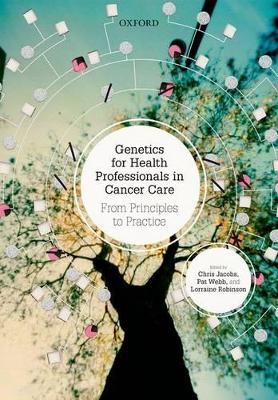
Genetics for Health Professionals in Cancer Care
Oxford University Press (Verlag)
978-0-19-967284-4 (ISBN)
The role of genetics is becoming increasingly important in all aspects of healthcare and particularly in the field of cancer care. Genetics for Health Professionals in Cancer Care: From Principles to Practice equips health professionals with the knowledge and skills required for all aspects of managing cancer family history. This includes taking an accurate cancer family history and drawing a family tree; understanding cancer biology, basic cancer genetics and the genes involved in hereditary breast, ovarian, prostate, colorectal, gastric and related gynaecological cancers and rare cancer predisposing syndromes; assessing cancer risk and communicating risk information; early detection and risk reducing measures available for those at increased risk and managing individuals with hereditary cancer.
Drawing on experiences of health professionals, Genetics for Health Professionals in Cancer Care discusses the challenges raised and provides practical advice and insight into what happens when a patient is referred for genetic counselling and genetic testing, including the psychological, social and ethical issues faced by individuals and families with and at risk of hereditary cancer. The book also provides practical guidance on setting up a cancer family history clinic in primary and secondary care.
Genetics for Health Professionals in Cancer Care is essential reading for healthcare professionals working with cancer patients and their families, and is an ideal reference text for non-specialists working in cancer genetics.
Prior to becoming a genetic counsellor, Chris was an experienced critical care nurse and transplant coordinator. She was appointed to the post of Consultant Genetic Counsellor in Cancer Genetics in 2006 and has led/ jointly led the cancer genetics service for the South East of England since 2008. In addition to providing genetic counselling, her service development experience has included setting up and establishing a network of cancer risk assessment clinics and establishing and running a BRCA family service for patients with BRCA1/2 gene mutations and developing, implementing a rapid breast cancer risk assessment service and Mismatch Repair gene testing service. Her educational and research interests are in improving communication and understanding about cancer genetics. Chris is the clinical lead for the Advanced Healthcare Practice in Cancer Genetics course, run jointly by King's College London and St. George's University of London and Kingston University. Lorraine Robinson has worked as a Lecturer for several years both at King's College London and The Royal Marsden Hospital. Her interests are in cancer care, breast care, psychological interventions and health policy. She has worked as an Associate Journal Editor and has had key positions within the RCN Cancer Nursing Society and EONS. Lorraine is undertaking a Doctorate in Healthcare with her research focussing on the needs of women living with metastatic breast cancer. At present Lorraine is the Programme Leader for the BSc programmes in Cancer Care, Palliative Care and Haemato-oncology and the Lead for the pre-registration BSc Adult Nursing course. Pat Webb is committed to delivering a multi-professional and collaborative approach to cancer and palliative care in clinical work, education and research. In her current role (Principal Lecturer in the Faculty of Health and Social Care Sciences, and Course Director, MSc Healthcare at St. George's University of London), she is the strategic lead in cancer and palliative care research and education, running and developing the curricula for post graduate modules in cancer and End of Life Care. In addition, Pat was the Editor of the international peer-reviewed journal, European Journal of Cancer Care for 18 years until 2009. Pat has used her nursing qualification and experience to work across professional disciplines, and statutory and voluntary sectors. This has included reporting on the ethics of palliative care for the Bioethics division of the European Commission and organizing and lecturing on cancer and palliative care programmes through the European School of Oncology.
SECTION 1: PUTTING CANCER GENETICS INTO CONTEXT; SECTION 2: CANCER GENETICS: THE BASICS; SECTION 3: GENETICS OF SPECIFIC CANCERS; SECTION 4: CANCER RISK ASSESSMENT AND COMMUNICATING RISK; SECTION 5: EARLY DETECTION OF HEREDITARY CANCER; SECTION 6: REDUCING THE RISK OF CANCER; SECTION 7: MANAGING HEREDITARY CANCER; SECTION 8: GENETIC COUNSELLING AND SUPPORTING INDIVIDUALS WITH A FAMILY HISTORY OF CANCER; SECTION 9: MANAGING CANCER FAMILY HISTORY IN PRIMARY, SECONDARY AND PALLIATIVE CARE
| Erscheint lt. Verlag | 19.8.2014 |
|---|---|
| Verlagsort | Oxford |
| Sprache | englisch |
| Maße | 183 x 246 mm |
| Gewicht | 630 g |
| Themenwelt | Medizin / Pharmazie ► Medizinische Fachgebiete ► Gynäkologie / Geburtshilfe |
| Medizinische Fachgebiete ► Innere Medizin ► Gastroenterologie | |
| Medizin / Pharmazie ► Medizinische Fachgebiete ► Onkologie | |
| Medizin / Pharmazie ► Medizinische Fachgebiete ► Urologie | |
| Studium ► 2. Studienabschnitt (Klinik) ► Humangenetik | |
| ISBN-10 | 0-19-967284-9 / 0199672849 |
| ISBN-13 | 978-0-19-967284-4 / 9780199672844 |
| Zustand | Neuware |
| Haben Sie eine Frage zum Produkt? |
aus dem Bereich


